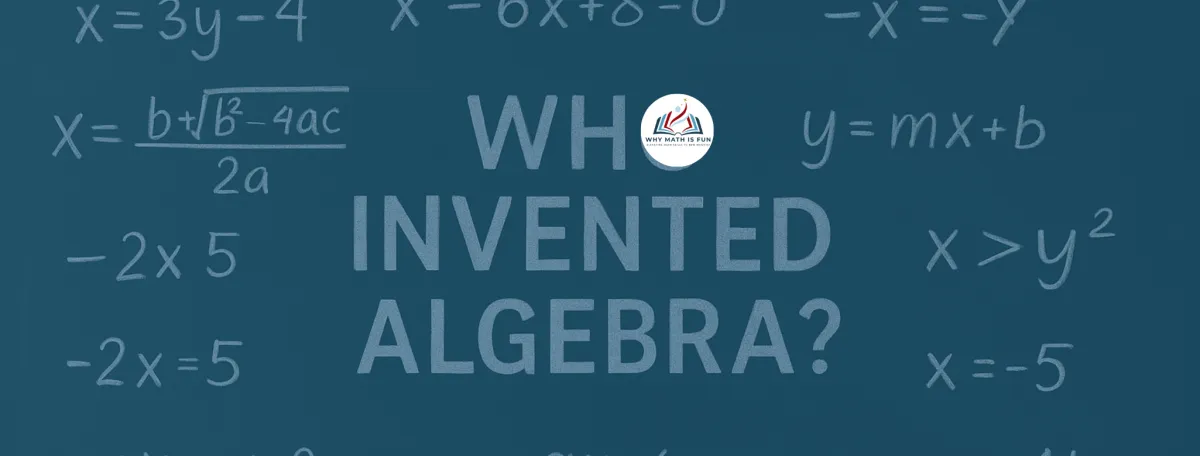
Who invented Algebra?
When you hear the word algebra, what do you think of? Maybe solving for x, or trying to figure out tricky word problems. But did you ever wonder — who came up with algebra in the first place?
The answer might surprise you. Algebra wasn’t invented by just one person. It was built over thousands of years by many smart people in different parts of the world. From ancient Babylonians to Indian and Muslim scholars to European thinkers, algebra is something many cultures helped create.
Let’s take a journey through time and see how this amazing part of math came to life.
Algebra Begins in Ancient Babylon
More than 4,000 years ago, people in Babylon (what is now Iraq) were already solving math problems that looked a lot like algebra. They didn’t use letters or symbols like we do today. Instead, they wrote their math in words on clay tablets.
Even without modern tools, they could solve problems like this:
"I have taken the side of a square away from its area, and what’s left is 14. What’s the side?"
They didn’t call it algebra, but they were doing the same kinds of thinking. This was one of the first steps in the history of algebra.
Big Math Ideas from India
About 1,300 years ago, math was growing in India, too. A famous Indian mathematician named Brahmagupta made some very important discoveries. He was one of the first to:
Use zero as a real number
Work with negative numbers
Use letters to stand for unknown numbers
These ideas helped algebra become more powerful and flexible. Without them, modern algebra might not exist.

The Man Who Gave Algebra Its Name
In the 800s, a man named Al-Khwarizmi lived in Baghdad. He was a scholar during a time known as the Islamic Golden Age. He wrote a famous math book called "The Book of Restoring and Balancing."
The Arabic word for restoring is "al-jabr" — and that’s where we get the word algebra.
Al-Khwarizmi’s book demonstrated how to solve various types of equations step by step. Instead of just solving one problem, he explained how to solve many types of problems. That’s why many people consider him the “father of algebra.”
How Algebra Traveled Around the World
After Al-Khwarizmi’s book, many other Muslim mathematicians added new ideas to algebra. They used it to study the stars, design buildings, and solve money problems.
Later, in the 1100s and 1200s, scholars in Europe started reading Arabic math books that had been translated into Latin. This helped algebra spread from the Middle East to Europe.

One of the most important European mathematicians was Fibonacci. He helped introduce Arabic and Indian math ideas to European people and schools.
The Greek Mathematician Many Forgot
Before Al-Khwarizmi, there was a Greek math expert named Diophantus. He lived around 250 CE. He wrote a book called Arithmetica, where he used symbols to stand for unknown numbers, just like we do in algebra today.
His work was not widely known in the Islamic world, and many people forgot about it for a long time. But when it was rediscovered in Europe, it inspired many future mathematicians.

Algebra Starts to Look Modern
In the 1500s and 1600s, algebra began to look more like what we use today. That’s when European mathematicians started using:
Letters like x and y for unknown numbers
Symbols like +, -, =, and √
Shortcuts like exponents (such as x² and x³)
People like François Viète and René Descartes helped make algebra easier to write and use. Soon, algebra became the main language of science and engineering.
So Who Really Invented Algebra?
The truth is that no single person invented algebra. It grew over time, with help from many people in different places.
Here’s a quick summary:
The Babylonians solved word problems with equations
Indian mathematicians used zero, negative numbers, and letters
Muslim scholars like Al-Khwarizmi gave algebra its name and methods
Greek thinkers like Diophantus used early symbols
Europeans added the modern symbols and rules we use today
Algebra is like a giant puzzle that people all over the world have worked on together.

Why This History Matters
Learning where algebra came from helps us understand that:
Math belongs to everyone, not just one group or place
Big ideas take time and teamwork to grow
Sharing knowledge helps everyone learn more
When you solve an equation, you’re not just doing homework. You’re joining a story that goes back thousands of years.
The Conclusion of the Matter
Algebra is one of the most powerful tools humans have ever created. But it wasn’t made by just one person or one culture. It came from many people, working over many years, in many parts of the world.
So the next time you solve for x, remember — you’re part of something amazing.

